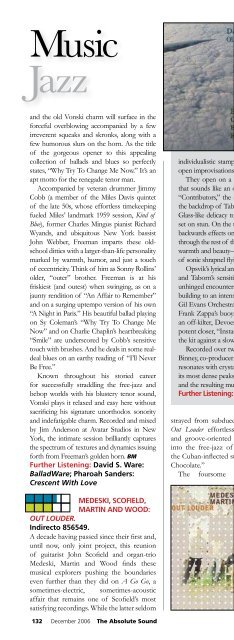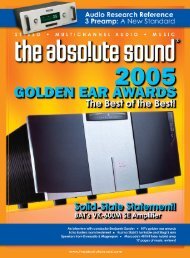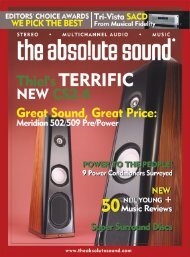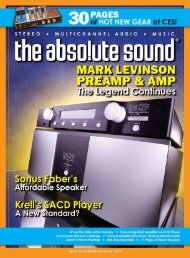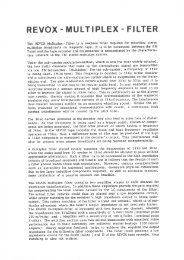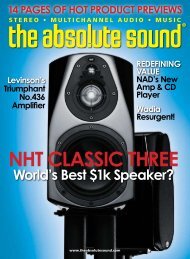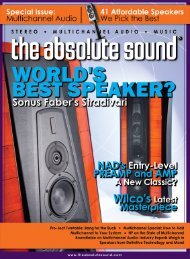You also want an ePaper? Increase the reach of your titles
YUMPU automatically turns print PDFs into web optimized ePapers that Google loves.
Music<br />
Jazz<br />
and the old Vonski charm will surface in the<br />
forceful overblowing accompanied by a few<br />
irreverent squeaks and skronks, along with a<br />
few humorous slurs on the horn. As the title<br />
of the gorgeous opener to this appealing<br />
collection of ballads and blues so perfectly<br />
states, “Why Try To Change Me Now.” It’s an<br />
apt motto for the renegade tenor man.<br />
Accompanied by veteran drummer Jimmy<br />
Cobb (a member of the Miles Davis quintet<br />
of the late 50s, whose effortless timekeeping<br />
fueled Miles’ landmark 1959 session, Kind of<br />
Blue), former Charles Mingus pianist Richard<br />
Wyands, and ubiquitous New York bassist<br />
John Webber, Freeman imparts these oldschool<br />
ditties with a larger-than-life personality<br />
marked by warmth, humor, and just a touch<br />
of eccentricity. Think of him as Sonny Rollins’<br />
older, “outer” brother. Freeman is at his<br />
friskiest (and outest) when swinging, as on a<br />
jaunty rendition of “An Affair to Remember”<br />
and on a surging uptempo version of his own<br />
“A Night in Paris.” His beautiful ballad playing<br />
on Sy Coleman’s “Why Try To Change Me<br />
Now” and on Charlie Chaplin’s heartbreaking<br />
“Smile” are underscored by Cobb’s sensitive<br />
touch with brushes. And he deals in some realdeal<br />
blues on an earthy reading of “I’ll Never<br />
Be Free.”<br />
Known throughout his storied career<br />
for successfully straddling the free-jazz and<br />
bebop worlds with his blustery tenor sound,<br />
Vonski plays it relaxed and easy here without<br />
sacrificing his signature unorthodox sonority<br />
and indefatigable charm. Recorded and mixed<br />
by Jim Anderson at Avatar Studios in New<br />
York, the intimate session brilliantly captures<br />
the spectrum of textures and dynamics issuing<br />
forth from Freeman’s golden horn. BM<br />
Further Listening: David S. Ware:<br />
BalladWare; Pharoah Sanders:<br />
Crescent With Love<br />
Medeski, Scofield,<br />
Martin and Wood:<br />
Out Louder.<br />
Indirecto 856549.<br />
A decade having passed since their first and,<br />
until now, only joint project, this reunion<br />
of guitarist John Scofield and organ-trio<br />
Medeski, Martin and Wood finds these<br />
musical explorers pushing the boundaries<br />
even further than they did on A Go Go, a<br />
sometimes-electric, sometimes-acoustic<br />
affair that remains one of Scofield’s most<br />
satisfying recordings. While the latter seldom<br />
David Binney:<br />
Out of Airplanes.<br />
Binney, producer.<br />
Mythology Records 0005.<br />
A distinctive alto sax player, innovative composer,<br />
and restlessly creative sonic provocateur, David<br />
Binney surrounds himself with stellar company<br />
on Out of Airplanes, his eighth recording as a<br />
leader. Guitarist Bill Frisell, keyboardist Craig<br />
Taborn (a ubiquitous figure on New York’s<br />
downtown music scene), bassist Eivind Opsvik,<br />
and drummer Kenny Wollesen (a member<br />
of Frisell’s group and Sex Mob) all put their<br />
individualistic stamps on Binney’s intriguing compositions, and particularly on three wideopen<br />
improvisations.<br />
They open on a dissonant note with “Brainstorms, Pt. 1,” an edgy free-form excursion<br />
that sounds like an outtake from Miles Davis’ On the Corner sessions. On Binney’s fugue-like<br />
“Contributors,” the saxophonist engages in sparse contrapuntal dialogue with Frisell against<br />
the backdrop of Taborn’s hypnotic piano ostinato. As the piece builds dynamically, from Philip<br />
Glass-like delicacy to screaming crescendo, Frisell commits sonic mayhem with his fuzz box<br />
set on stun. On the title track, the guitarist again unleashes hellacious, grunge-laden loops and<br />
backwards effects on the tumultuous middle section, then wails with distortion-laced impunity<br />
through the rest of the piece. The poignant “Home” carries a simple, heartland feel that radiates<br />
warmth and beauty—right up until the moment that Frisell stomps on the fuzz and sends bits<br />
of sonic shrapnel flying in all directions.<br />
Opsvik’s lyrical and introspective “Jan Mayen,” underscored by Wollesen’s gentle brushwork<br />
and Taborn’s sensitive touch on piano, offers a calming breath between the more densely<br />
unhinged encounters. Binney delivers one of his more impassioned alto solos here, gradually<br />
building to an intense peak (reminiscent of David Sanborn’s more emotive playing with the<br />
Gil Evans Orchestra) as the tune picks up steam. Binney’s brief “Wild Child” recalls one of<br />
Frank Zappa’s buoyant, chamber-like ditties like “Sofa No. 2,” while “Brainstorms Pt. 2” is<br />
an off-kilter, Devoesque interlude underscored by Wollesen’s mechanical backbeat. On the<br />
potent closer, “Instant Distance,” Binney turns Wollesen loose for some whirlwind flailing on<br />
the kit against a slow, deliberate ostinato played in unison by the rest of the band.<br />
Recorded over two days last March in Frisell’s hometown of Seattle and jointly mixed by<br />
Binney, co-producer Opsvik, and Mike Marciano at Systems Two in Brooklyn, Out of Airplanes<br />
resonates with crystal clarity at its most precious moments and rocks with tumultuous fury at<br />
its most dense peaks. The chemistry established on these experimental vehicles is immediate,<br />
and the resulting music is both provocative and compelling. BM<br />
Further Listening: Cuong Vu: It’s Mostly Residual; Richter 858: Music By Bill Frisell<br />
strayed from subdued straight-ahead funk,<br />
Out Louder effortlessly merges avant-jazz<br />
and groove-oriented influences, stretching<br />
into the free-jazz of “Miles Behind” and<br />
the Cuban-inflected styling of “Tequila and<br />
Chocolate.”<br />
The foursome has clearly gained<br />
confidence and learned to loosen up since<br />
last meeting. Case in point is the deliciously<br />
funky groove of “Tootie Ma is a Big Fine<br />
Thing.” In lesser hands, this seemingly simple<br />
jam might be dismissed as a tossed-off track.<br />
But it’s exhilarating to hear these modernjazz<br />
greats at play, drummer Billy Martin<br />
serving up a Meters-inspired syncopated<br />
New Orleans beat; bassist Chris Wood<br />
laying down a dizzying bass line; organist<br />
John Medeski punctuating the rhythms<br />
with razor-sharp accents; and Scofield<br />
snaking lithe guitar lines throughout. It’s<br />
akin to watching master chefs concocting<br />
sumptuous gumbo out of table scraps.<br />
With each successive track, the quartet<br />
utilizes a new device, sound, tone, or<br />
direction—a touch of Memphis blues here,<br />
a flash of psychedelia there. One moment,<br />
Scofield is channeling Jimi Hendrix on<br />
the space jam “What Now”; the next,<br />
he’s reaching into his trick bag for sultry<br />
132 December 2006 The Absolute Sound


